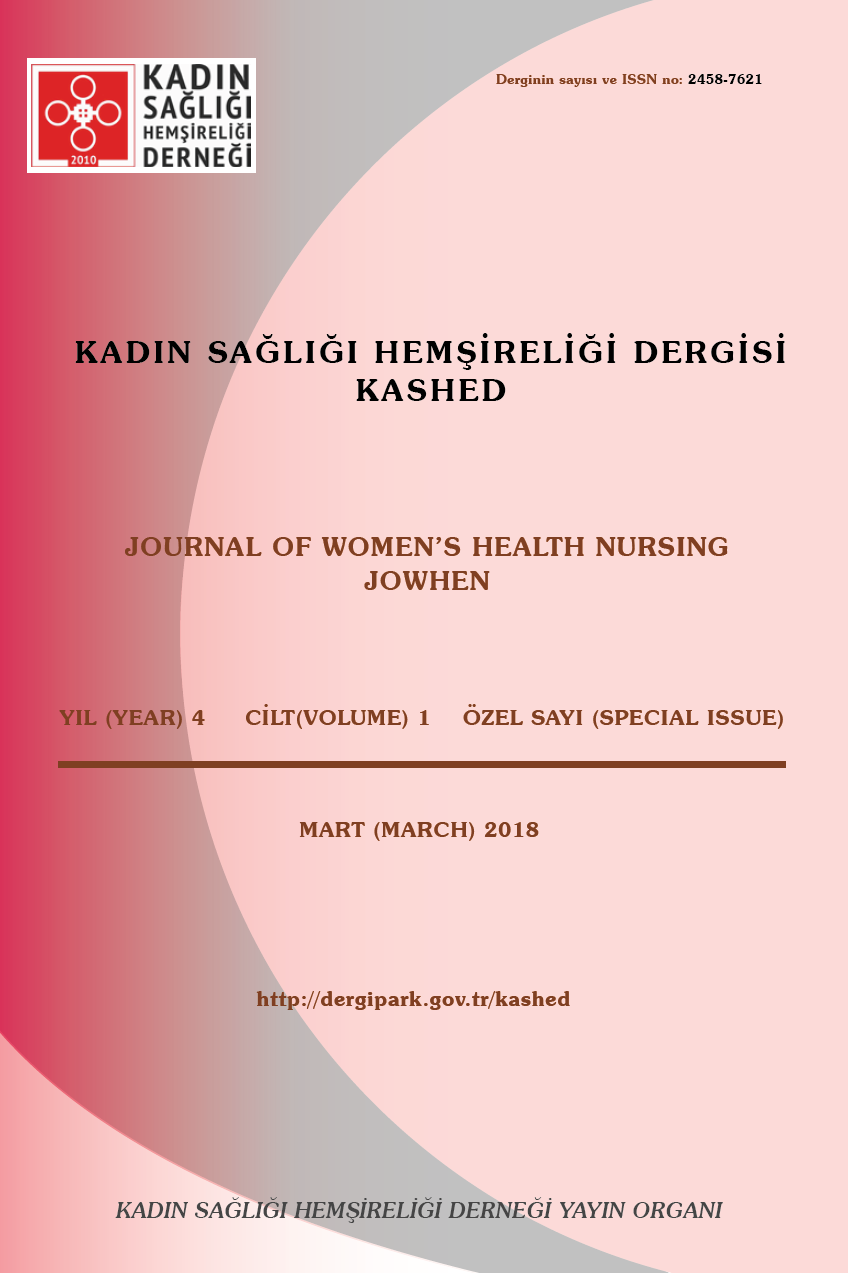Emzirme danışmanlığı dersinin ebelik öğrencilerinin eğitimlerine etkisi ve bakış açıları
Amaç: Emzirme anne ve bebek sağlığı için çok önemlidir. Etkili bir emzirme danışmanlığı, sağlıklı bir emzirme dönemi sağlar. Ebelerin gerekli tüm nitelikleri kazanabilmeleri için lisans eğitimlerinde kapsamlı bir şekilde emzirme danışmanlığını öğrenmelidirler. Bu çalışmada, ebelik bölümü lisans öğrencilerine verilen emzirme danışmanlığı derslerinin eğitim öncesi ve sonrası bilgi durumlarına etkisinin karşılaştırılması amaçlanmıştır.
Yöntemler: Araştırma deneysel, tek grup ön test-son test tasarımlı yürütüldü. Bu çalışma Ocak-Aralık 2020 tarihleri arasında bir üniversitede öğrenim gören 91 öğrenci ile gerçekleştirildi. 14 hafta boyunca haftada iki saat ders verildi. Ders, meme anatomisi ve fizyolojisi, emzirme yöntemleri, pozisyonları, emzirme endikasyonları ve kontrendikasyonları konularını içerdi. Elde edilen verilerin analizinde anlamlılık p
Anahtar Kelimeler:
Emzirme, Ebelik eğitimi, Tıbbi eğitim
The effects of the breastfeeding counseling course on the education of midwifery students and their perspectives
Objective: Breastfeeding is essential for mother and baby health. An effective breastfeeding counseling ensures a healthy breastfeeding period. Midwives must learn comprehensively in their undergraduate education to gain all the necessary qualifications for this counseling. This study, it is aimed to compare the effect of breastfeeding counseling courses given to undergraduate students of the midwifery department on pre-and post-education information situations.
Methods: The study was conducted in an experimental, single group pre-test-post-test design. This study was conducted with 91 students studying at a university from January to December 2020. Two hours of lessons per week were given for 14 weeks. A course included breast anatomy and physiology, breastfeeding methods, positions, breastfeeding indications, and contraindications. In the analysis of the information obtained, significance was accepted as p
Keywords:
Breastfeeding, Midwifery education, Medical education,
___
- Referans1 Agency for Healthcare Research and Quality. (2007). Breastfeeding and maternal and infant health outcomes in developed countries. 2007; http://www.ahrq.gov/clinic/tp/brfouttp. htm#Report (Access date: 05.04.2020)
- Referans2 Ahmed, A., & Bantz, D. (2011). Richardson C. Breastfeeding knowledge of university nursing students, The American Journal of Maternal Child Nursing, 36(6), 361-367. https://doi.org/10.1097/NMC.0b013e31822de549.
- Referans3 Ahmed, A., & El Guindy, S, R. (2011). Breastfeeding knowledge and attitudes among Egyptian baccalaureate students, International Nursing Review, 58, 372–378. https://doi.org/10.1111/j.1466-7657.2011.00885.x
- Referans4 American Academy of Pediatrics. (2005). Breastfeeding and the use of human milk, Pediatrics, 115(2), 496-506. https://doi.org/10.1542/peds.2004-2491
- Referans5 American Academy of Family Physicians. (2008). Breastfeeding Advisory Committee Breastfeeding, family physicians supporting (position paper). http://www.aafp.org/online/en/home/policy/policies/b/breastfeedingpositionpaper.html (Access date: 01.05.2020)
- Referans6 American College of Obstetricians and Gynecologists. (2007). Breastfeeding: Maternal and infants’ aspects. http://www.acog.org/departments/underserved/clinicalReviewv12i1s.pdf (Access date: 21.08.2020).
- Referans7 Association of Women’s Health, Obstetric, and Neonatal Nurses. (2007). Breastfeeding (position statement). http://www.awhonn.org/awhonn/content.do?name=05_HealthPolicyLegislation/5H_PositionStatements.htm (Access date: 01.03.2020)
- Referans8 Boyd, A, E., & Spatz, D, L. (2013). Breastfeeding, and human lactation: Education and curricular issues for pediatric nurse practitioners, Journal of Pediatric Health Care, 27, 83-90. https://doi.org/10.1016/j.pedhc.2011.03.005
- Referans9 Davis, A., & Sherrod, R, A. (2015). Effects of an Educational Intervention on Baccalaureate Nursing Students' Knowledge and Attitude in Providing Breastfeeding Support to Mothers, The International journal of childbirth education: the official publication of the International Childbirth Education Association, 30(4), 8-12
- Referans10 Datta, J., Graham, B., & Wellings, K. (2012). The role of fathers in breastfeeding: Decision-making and support, British Journal of Midwifery, 20(3), 159-167 https://doi.org/10.12968/bjom.2012.20.3.159
- Referans11 Dodgson, J,E., & Tarrant, M. (2007). Outcomes of a breastfeeding educational intervention for baccalaureate nursing students, Nurse Education Today, 27, 856–867. https://doi.org/10.1016/j.nedt.2006.12.001
- Referans12 Furber, C, M., & Thomson, A, M. (2008). The emotions of integrating breastfeeding knowledge into practice for English midwives: A qualitative study, International Journal of Nursing Studies, 45,286–297. https://doi.org/10.1016/j.ijnurstu.2006.08.017
- Referans13 Gu, Y., Zhu, Y., & Zhang, Z. (2016). Effectiveness of a theory-based breastfeeding promotion intervention on exclusive breastfeeding in China: A randomised controlled trial, Midwifery, 42, 93-99. https://doi.org/10.1016/j.midw.2016.09.010
- Referans14 Hector, D, J., King, L., & Webb, K, L. (2005). Factors affecting breastfeeding practices. Applying a conceptual framework, New South Wales Public Health Bulletin, 16(3-4), 52-55 https://doi.org/10.1071/NB05013
- Referans15 Hellings, P., & Howe, C. (2004). Breastfeeding knowledge and practice of pediatric nurse practitioners, Journal of Pediatric Health Care, 18, 8-14. https://doi.org/10.1016/s0891-5245(03)00108-1
- Referans16 Kang, N, M., Song, Y., & Im, E, C. (2005). Korean university students’ knowledge and attitudes toward breastfeeding: A questionnaire survey, International Journal of Nursing Studies, 42, 863-870. https://doi.org/10.1016/j.ijnurstu.2005.01.003
- Referans17 Laanterä, S., Pölkki, T., & Pietilä, A, M. (2011). A descriptive qualitative review of the barriers relating to breast-feeding counselling, International Journal of Nursing Practice, 17(1), 72-84. https://doi.org/10.1111/j.1440-172X.2010.01909.x
- Referans18 McLaughlin, M., Fraser, J., & Young, J. (2011). Paediatric nurses' knowledge, and attitudes related to breastfeeding and the hospitalised infant, Breastfeed Review, 19(3), 13-24. https://pubmed.ncbi.nlm.nih.gov/22263373/
- Referans19 Mizrak, B., Ozerdogan, N., & Colak, E. (2017). The Effect of Antenatal Education on Breastfeeding Self-Efficacy: Primiparous Women in Turkey, International Journal of Caring Sciences, 10(1), 503-510. https://www.researchgate.net/publication/316646169_The_Effect_of_Antenatal_Education_on_Breastfeeding_Self-Efficacy_Primiparous_Women_in_Turkey
- Referans20 Patel, S., & Patel, S. (2016). The effectiveness of lactation consultants and lactation counsellors on breastfeeding outcomes, Journal of Human Lactation, 32(3), 530–541. https://doi.org/10.1177/0890334415618668
- Referans21 Pisacane, A., Continisio, G, I., & Aldinucc, M. (2005). Controlled trial of the father's role in breastfeeding promotion, Pediatrics, 116(4), 494-8. https://doi.org/10.1542/peds.2005-0479
- Referans22 Radzyminski, S., & Callister, L, C. (2015). Health Professionals’ Attitudes and Beliefs About Breastfeeding, Journal of Perinatal Education, 24(2), 102–109. https://doi.org/10.1891/1058-1243.24.2.102
- Referans23 Webber, E., & Serowoky, M. (2016). Breastfeeding curricular content of family nurse practitioner programs, Journal of Pediatric Health Care, 31(2), 189-195. https://doi.org/10.1016/j.pedhc.2016.07.006
- Referans24 World Health Organization. (2018). WHO Guideline: counselling of women to improve breastfeeding practices. World Health Organization. https://www.who.int/nutrition/publications/guidelines/counselling-women-improve-bf-practices/en/ (Access date: 01.07.2021)
- Referans25 World Health Organization. (2019). Breastfeeding education for increased breastfeeding duration”. World Health Organization. https://www.who.int/elena/titles/breastfeeding_education/en/ (Access date: 07.02.2021)
- Referans26 Zahid, I., Sheikh, R., & Ahmed, A. (2016). Knowledge and beliefs regarding breastfeeding in college students of Karachi, Australasian Medical Journal, 9(10), 386–395. https://doi.org/10.4066/AMJ.2016.2712
- ISSN: 2458-7621
- Başlangıç: 2014
- Yayıncı: Kadın Sağlığı Hemşireleri Derneği
Sayıdaki Diğer Makaleler
Nevin AKDOLUN BALKAYA, Çiğdem BİLGE, Sevgül DÖNMEZ
Emzirme danışmanlığı dersinin ebelik öğrencilerinin eğitimlerine etkisi ve bakış açıları
Ayşegül ŞİMŞEK, Esra ÇALIŞKAN, Elif BALKAN, Refika GENÇ
Klinik Bakım Haritaları Hasta Bakımını Standartlaştırabilir mi? Kalite İyileştirme Çalışması
ERKEKLER İÇİN PREKONSEPSİYONEL DANIŞMANLIK VE BAKIM HİZMETLERİ
